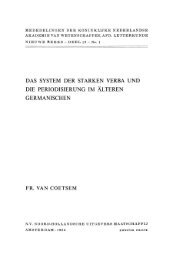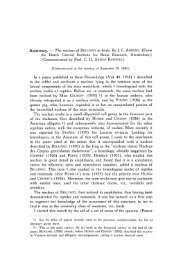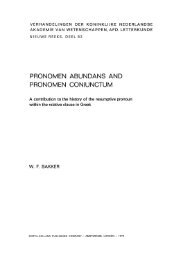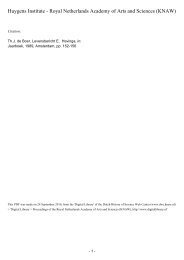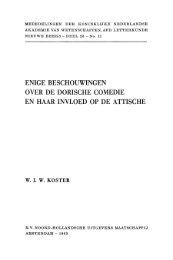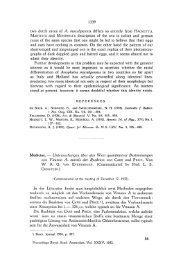Studies on Panini's grammar - DWC
Studies on Panini's grammar - DWC
Studies on Panini's grammar - DWC
Create successful ePaper yourself
Turn your PDF publications into a flip-book with our unique Google optimized e-Paper software.
68 <str<strong>on</strong>g>Studies</str<strong>on</strong>g> <strong>on</strong> Pä~ini' s Grammar<br />
LXII) , wh en he expresses himself in the following words: 'Pä~ini selbst<br />
nennt eine Anzahl Vorgänger. Ja sein Werk scheint wesentlich eine Neu~<br />
redakti<strong>on</strong> eines. vielleicht vor ihm sch<strong>on</strong> mehrfach umredigierten, gram~<br />
matischen Grundwerks zu sein. Ein rati<strong>on</strong>eller Grundplan schimmert<br />
durch ...... Aber dieser Aufbau wird beständig durch einzelne Regeln oder<br />
ganze Reihen v<strong>on</strong> Regeln durchbrochen, oEfenbar, weil man nach Bequem~<br />
lichkeit an beliebiger Stelle einschob, was bei weiter entwickelter Forschung<br />
neu hinzukam. Auch mochte die Möglichkeit Worte zu ersparen etwa dazu<br />
fühun, Regeln aus ihrem natürlichen Zusammenhang herauszureissen und<br />
anderswohin zu versetzen. '<br />
So then Wackernagel. a great <strong>grammar</strong>ian, could not, as historiographer,<br />
see anything in Pä~ini save the dimlight of a rati<strong>on</strong>al plan and the deep<br />
night of historical chance, miserliness in words, love of ease, a breaking<br />
down of natural c<strong>on</strong>necti<strong>on</strong>s, the whole a whirlpool of caprice. Indeed,<br />
those ancient Hindu <strong>grammar</strong>ians have committed crime in not being<br />
bom as modern. logical. strenuous and capriceless European scholars,<br />
writers of books as weil arranged as the safes of a bank! However, the<br />
explorer who has in fact d<strong>on</strong>e so much to give us a full understanding and<br />
ajuster appreciati<strong>on</strong> of Pänini, really deserves something better than an<br />
ir<strong>on</strong>ical tirade. Let me say then that we, Europeans of the twentieth<br />
century, although grateful to the genius of the ancient Greeks, which with<br />
the help of geometrical textbooks and well~balanced political· speeches has<br />
taught us the power and beauty of the logical intellect, also realise that<br />
there is something else in the world of thought besides logic. C<strong>on</strong>temporary<br />
psychology has taught us that creative synthesis does not merely bel<strong>on</strong>g to<br />
critica 1 intellect and c<strong>on</strong>sciousness, but that also our dreams have their laws<br />
of compositi<strong>on</strong>, that the mind of the child, though weak in logical dis~<br />
criminati<strong>on</strong>, possesses a gift of c<strong>on</strong>structi<strong>on</strong>, which shows itself in the<br />
original touches of its traditi<strong>on</strong>al games, and that the artist is artist just<br />
because there is still so much of the child in him.<br />
When, then. in the A~tädhyäyi we meet with a w<strong>on</strong>derful. puerile and<br />
ingenuous anubandha~system , with mnemotechnical interests weighing<br />
heavier than auy log ic in the world, with associative digressi<strong>on</strong>s in unlimited<br />
number, then we c<strong>on</strong>fess: we adore Pä~ini because he reveals to us the<br />
spirit of India; we adore India because it reveals to us the Spirit, the Spirit.



